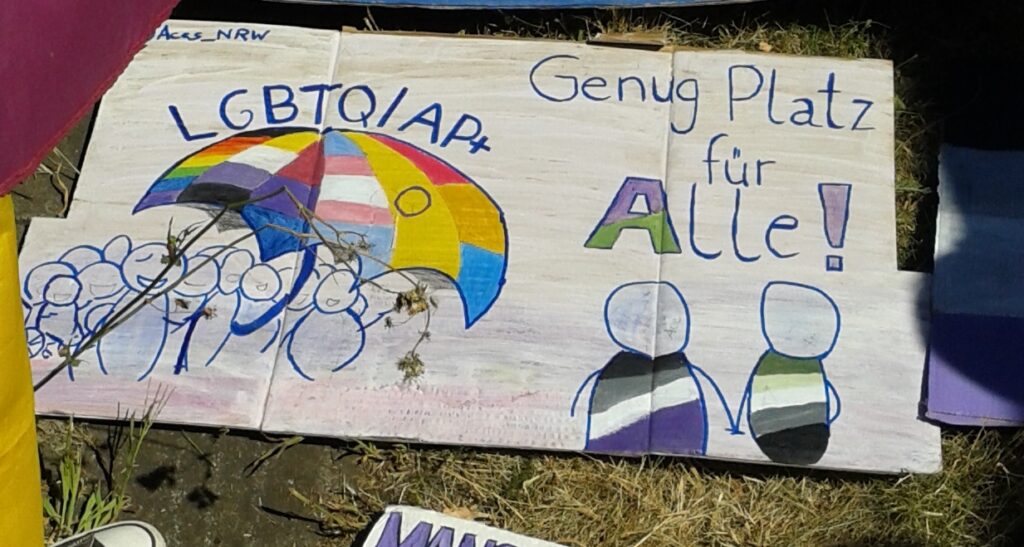Kaum zu glauben, aber AktivistA hat den Weg in eine offizielle Erklärung des Ministeriums für Familie, Senioren, Frauen und Jugend gefunden! Wir freuen uns sehr, in die Umsetzung des Aktionsplans „Queer leben“ eingebunden zu sein.

Der Aktionsplan „Queer leben“
Dass das Bundeskabinett einen Aktionsplan für queere Menschen verabschiedet hatte, ging gefühlt in manchen Medien ein wenig unter. Was mensch sowohl negativ wie postiv beurteilen kann. Den Text des Aktionsplans finden geneigte Lesende hier.
Die darin angesprochenen Punkte sind teils recht vage formuliert. Aus gutem Grund: Im Januar wurden Verbände und Vereine eingeladen, ihr Interesse an Mitarbeit für die konkrete Umsetzung zu bekunden. Was AktivistA getan hat, schon allein, weil im „LSBTIQ+“ des Bundesministeriums mindestens ein A fehlt. Gemeint sind zwar lesbische, schwule, bi, trans, inter, queere und sonstige Personen aus sexuellen und/oder geschlechtlichen Minderheiten, aber „und sonstige“ heißt leider oft nicht so viel, wie es sich eins wünscht. Viel zu oft haben asexuelle und aromantische Menschen die Erfahrung gemacht, als nicht queer (genug) zu gelten.
AktivistA ist dabei
Laut Ministerium sind wir nun ein Verband, und zwar einer von 78, die ihre Expertise einbringen dürfen. Zum Vergleich: Es hatten sich 140 Organisationen beworben. Als rein ehremamtlich betriebener und nicht eingetragener Verein hatten wir uns keine besonderen Chancen ausgerechnet. Allerdings, wir wurden ausgewählt und werden nun unser Bestes tun, sowohl das asexuelle als auch das aromantische Spektrum würdig zu vertreten. Dazu kooperieren wir mit AktivAro, deren Bewerbung leider nicht zum Erfolg führte. Da es in den ace und aro Communities auch viele trans und nicht-binäre Personen gibt, planen wir auch, die dgti und den Bundesverband Trans* in ihren Forderungen zu unterstützen.
Eingruppiert sind wir ins Thema „Gesundheit“. Für einen Verein, dessen Vereinszweck die Bildung ist, erst einmal nicht besonders intuitiv. Dennoch: Hier geht es um die Schlupflöcher im Verbot von Konversionsversuchen, um die Ausbildung medizinischen Personals und allerlei mehr. Für die psychosoziale und körperliche Gesundheit der A-Spektren nicht unwichtig, wenn wir uns die letzten Ergebnisse des Ace Community Survey ansehen.
Bislang können wir nur den Besuch einer Auftaktveranstaltung vermelden. Einen Bericht darüber gibt es beispielsweise bei queer.de.
Wir sind sehr gespannt, was weiter passiert.
